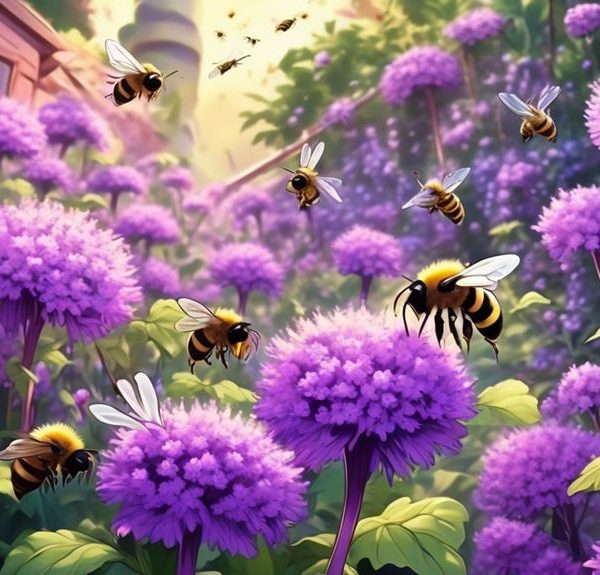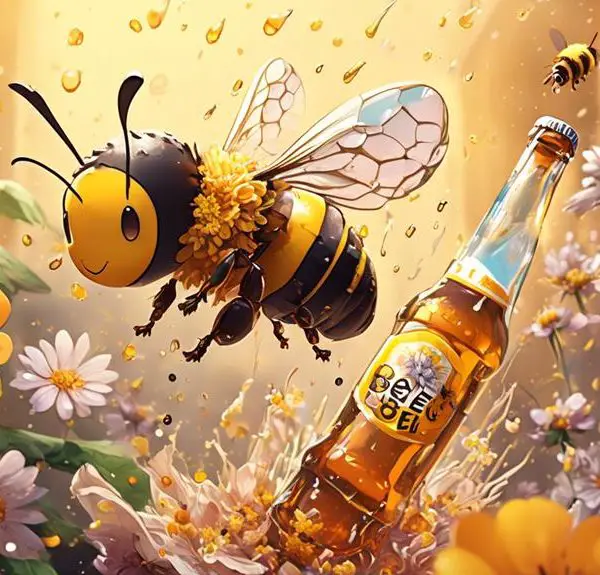Get buzzing with curiosity as we explore the intriguing relationship between bees and the captivating Ajuga plant.
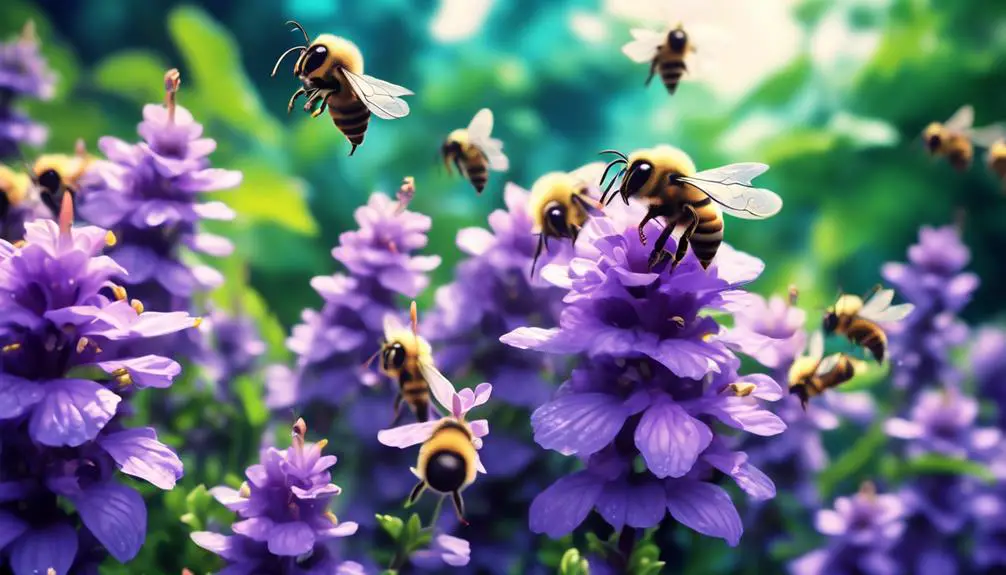
Do Bees Like Ajuga?
In a world that might seem as old as Methuselah, you're often intrigued by the intricate relationship between bees and plants. You're particularly curious about whether bees have a preference for the Ajuga plant.
Commonly known as bugleweed, Ajuga is a groundcover plant that sports eye-catching blue flowers, but does its beauty also attract our buzzing friends? We'll explore the importance of bees in pollination, their plant preferences and the potential allure of Ajuga.
Can this seemingly ordinary plant hold the key to attracting more bees? Let's find out.
Key Takeaways
- Ajuga is an attractive groundcover plant with vibrant blue flowers.
- Bees are attracted to Ajuga due to its visual appeal and the rich nectar in its flowers.
- Ajuga provides a consistent food supply for bees with its prolonged blooming period.
- The dense growth of Ajuga offers shelter and a safe haven for bees.
Understanding the Ajuga Plant
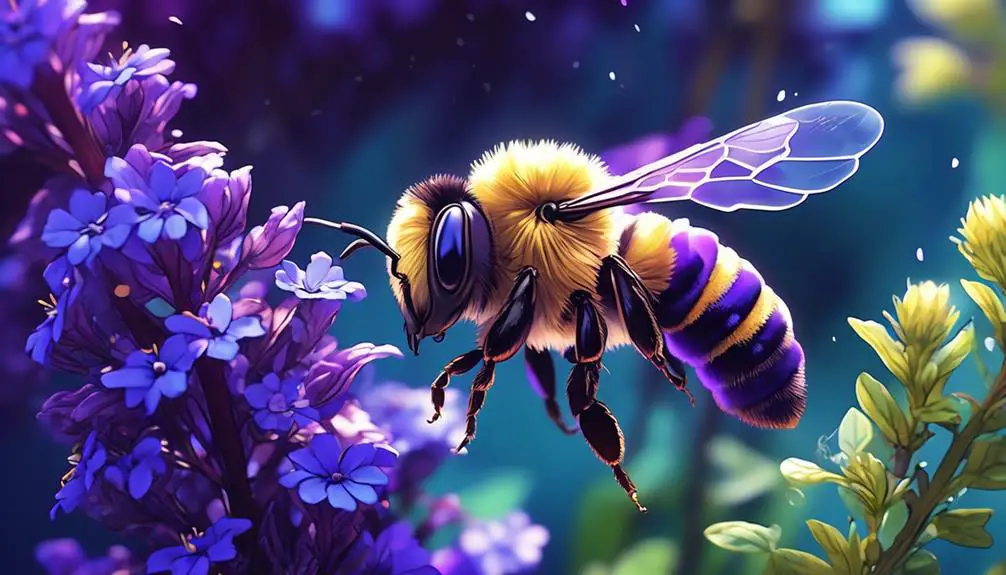
To fully appreciate why bees might be drawn to Ajuga, it's crucial to delve into understanding the distinctive characteristics of this versatile plant. Known also as bugleweed, Ajuga is a low-growing perennial, forming dense mats of attractive rosettes. Its alluring flowers, typically purple or blue, make it a garden favorite.
Ajuga's resilience is noteworthy. It's a tough plant, thriving in different soil types, from clay to sandy, and in varying light conditions, whether full sun or partial shade. It's drought-tolerant, too, which means it can withstand dry spells. You'll find it flourishing in your garden where other plants may struggle to survive.
The plant's pollen and nectar are what attract bees. Ajuga's vibrant, tubular flowers are brimming with these bee essentials. In fact, the plant is a vital nectar source when other blooms are scarce, particularly in early spring and late fall. Its long blooming period, from spring to early summer, provides bees with a steady food source.
The Importance of Bees in Pollination
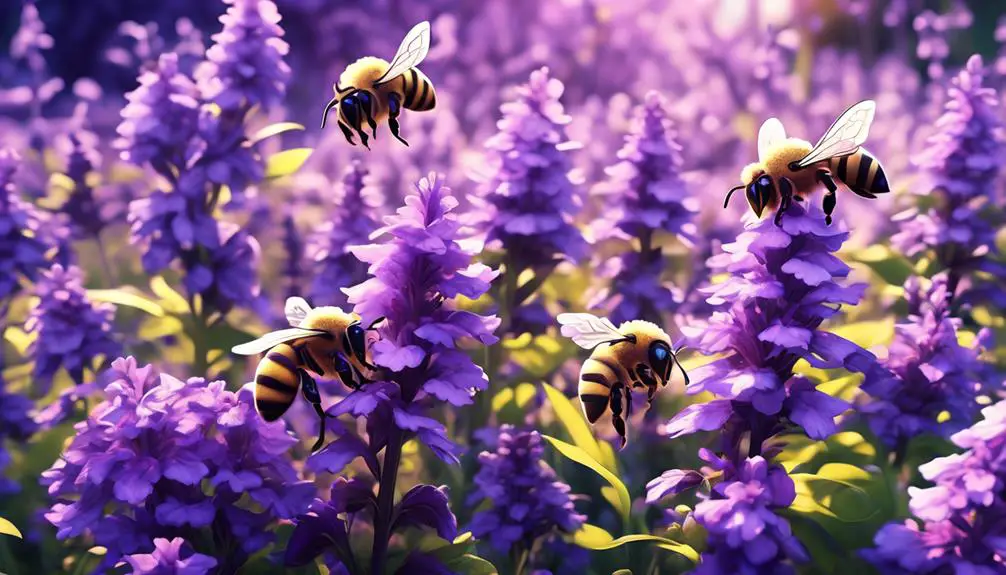
While Ajuga's vibrant flowers are a magnet for bees due to their rich nectar and pollen, it's important to note how crucial bees are in the process of pollination, playing a vital role in the lifecycle of many plants and crops. You may enjoy the sweet fruits of your labor in your garden, but you've got bees to thank for that. They're the unsung heroes of our ecosystem, transferring pollen from the male parts of a flower to the female parts, enabling fertilization and the growth of new seeds.
Did you know that approximately one-third of the food we eat is a direct result of bee pollination? That's right! Bees are essential for the pollination of fruits, vegetables, and nuts that make up a significant portion of our diets. Without bees, these plants would struggle to reproduce and our food supply would be significantly impacted.
Moreover, bees also play a critical role in the survival of wild plants. By aiding in their pollination, bees help maintain biodiversity in our ecosystems. It's a delicate balance, and bees are a vital link.
Bees and Their Plant Preferences
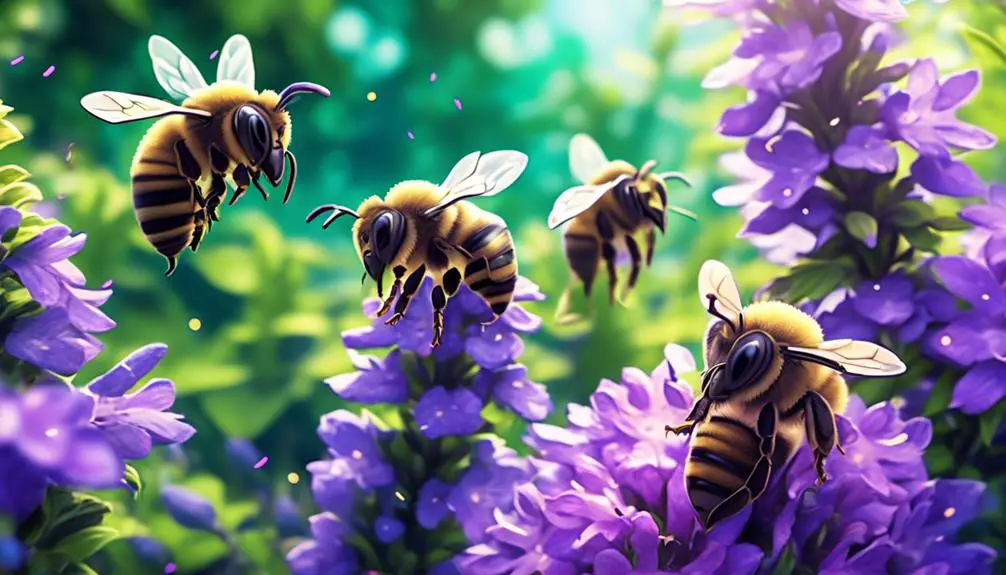
You might've noticed that bees don't just buzz around any plant; they've their particular favorites, and understanding these preferences can greatly enhance your efforts in creating a bee-friendly garden. Their choices aren't random. They're dictated by factors such as the presence of nectar, pollen quality, and flower shape and color.
For instance, bees are drawn to blue, purple, and yellow flowers. They're less likely to visit red flowers, as their vision doesn't perceive this color well. Bees also have a penchant for plants with flat or shallow blossoms, like ajuga, because they provide easy access to their nectar and pollen.
The quality of nectar and pollen are also crucial. Some plants, like the richly nectar-producing lavender, are bee magnets. Others, like corn, produce pollen that's nutritionally poor for bees, making them less attractive.
Plant diversity is another key aspect. Gardens with a variety of plants flowering at different times provide a continuous food source, making them more inviting to bees. So, if you're planning to attract bees, consider their preferences. Plant a diverse range of bee-friendly plants, and you'll have a buzzing, vibrant garden in no time.
Ajuga's Attractiveness to Bees
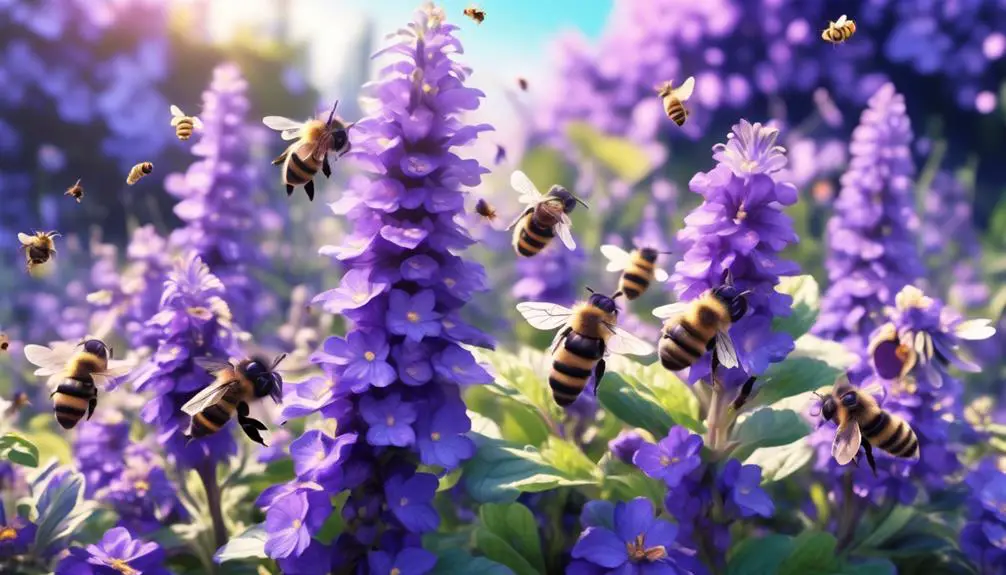
Diving into specifics, let's consider Ajuga, a bee-friendly plant that perfectly exemplifies some of the factors we've just discussed. You might be wondering why bees are so attracted to this plant. Well, it's a combination of the plant's rich nectar and vibrant colors, both of which are appealing to bees.
Here's a table to illustrate the fascinating relationship between Ajuga and bees:
Ajuga Features | Bee Preferences | Emotional Impact |
|---|---|---|
Vibrant Colors | Visual Attraction | Aesthetic Pleasure |
Rich Nectar | Nutritional Needs | Satisfaction |
Dense Growth | Shelter | Security |
Prolific Blooming | Sustained Resources | Abundance |
Invasive Nature | Easy Access | Convenience |
Notice the emotional impact each feature of Ajuga has on you as a gardener. It's not just about what bees need – you're also creating a beautiful, thriving garden that brings you joy and satisfaction. So, when you're planning your garden, consider Ajuga. It's not just a plant that bees love; it's a plant that adds value to your garden and your gardening experience. Remember, a garden buzzing with bees is a sign of a healthy ecosystem.
Benefits of Ajuga for Bees
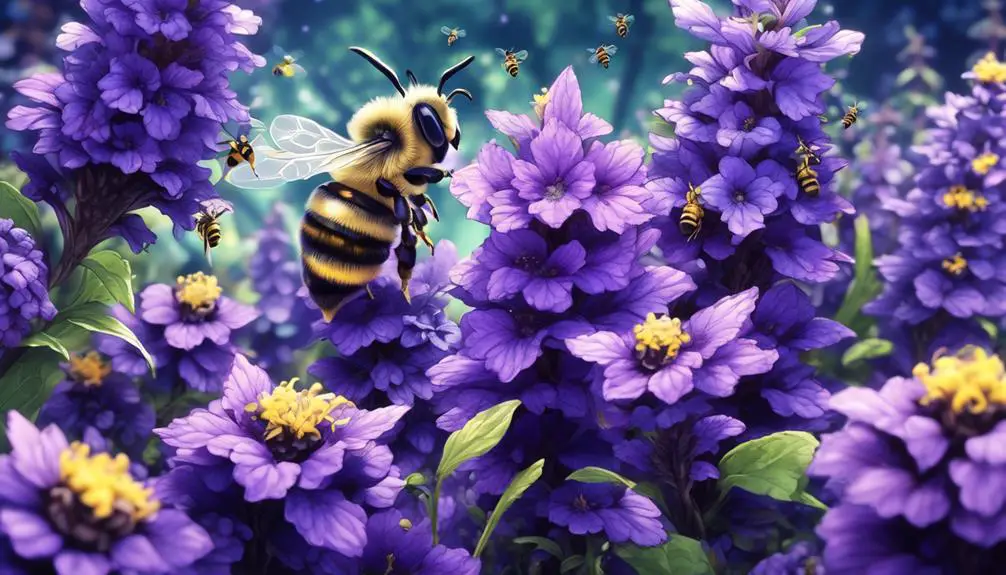
Undoubtedly, Ajuga offers a myriad of benefits for bees, ranging from nutritional sustenance to a safe haven for shelter. As you observe your garden, you'll likely notice these buzzing creatures tirelessly hovering over Ajuga's vibrant blooms. This isn't mere coincidence; Ajuga's flowers brim with nectar and pollen, vital food sources for bees. They're not just getting their daily dose of energy, they're also stocking up on essential proteins, fats, and minerals.
Next, let's delve into Ajuga's role as a safe haven. Amid your garden's flora, Ajuga's dense, low-growing foliage provides an ideal refuge for bees. It's here that they find respite from predators, harsh weather, and the midday sun. Bees, particularly those nesting underground, often seek out Ajuga's compact form for its protective qualities.
But there's more. Ajuga's prolonged flowering period is another boon for bees. It blooms from spring to late summer, providing a consistent food supply when other plants might be past their prime.
Incorporating Ajuga in Your Garden
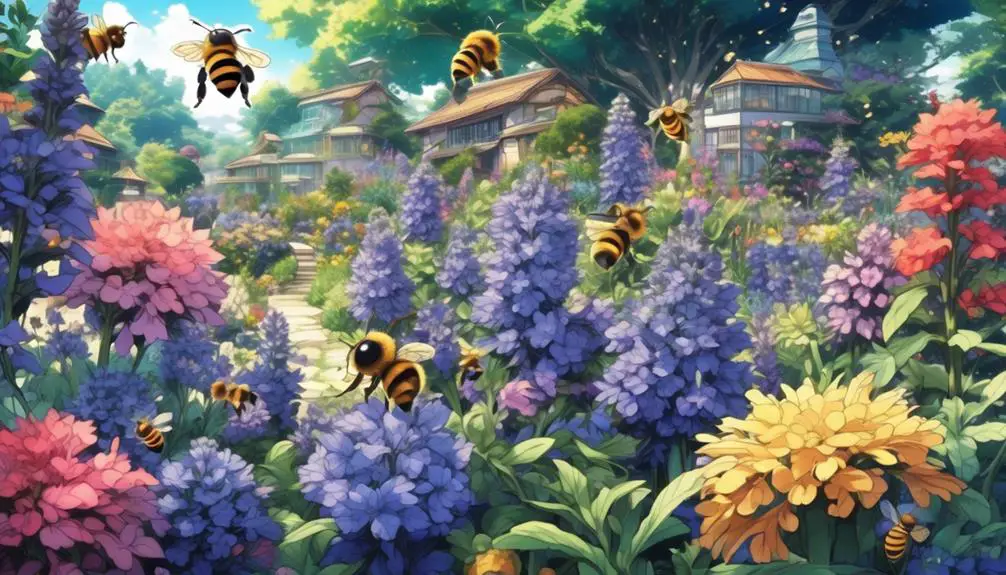
Recognizing the value Ajuga holds for our buzzing friends, it's worth considering how to strategically incorporate this plant into your garden to maximize its benefits for the local bee population.
This plant, also known as Bugleweed, thrives in partial to full shade and is quite hardy, making it ideal for various garden layouts.
Here's a quick guide to help you plan:
Ajuga Planting Time | Ajuga Care Level | Preferred Soil Type |
|---|---|---|
Early spring or fall | Low to moderate | Well-drained, moist |
It's vital to monitor the plant, ensuring it doesn't become invasive. Space the plants about a foot apart. They'll spread on their own, creating a dense carpet of foliage and flowers that bees can't resist.
It's also important to note that Ajuga is hardy and drought-resistant once established, but they do appreciate a little extra attention during dry spells.
Frequently Asked Questions
What Are the Potential Threats to Bees When They Interact With Ajuga Plants?
When you're considering the potential threats to bees interacting with ajuga plants, you'll find few. Ajuga's not known to be toxic to bees.
However, the plant's dense growth can limit access to other plants' nectar and pollen. If it's the only plant available, bees might struggle to get a balanced diet.
Pesticides used on ajuga can also harm bees. So, while ajuga's not directly dangerous, it can indirectly contribute to challenges for bees.
Are There Specific Species of Bees That Are More Attracted to Ajuga Than Others?
Yes, there are indeed specific species of bees more attracted to Ajuga. You'll often find honey bees and bumblebees buzzing around these plants. They're drawn to the blue-violet flowers, rich in nectar.
However, it's not just about preference. Their body size allows them to access the nectar easily. So, while other bees might visit Ajuga, honey bees and bumblebees are the ones you'll see most often.
Are There Other Insects That Are Attracted to Ajuga Plants Similar to Bees?
Yes, other insects are indeed attracted to Ajuga plants just like bees.
Butterflies, in particular, love Ajuga's vibrant blooms, while its dense foliage provides a perfect home for beetles and other crawling critters.
So, while you're likely to see bees buzzing around your Ajuga, don't be surprised if you spot other insects enjoying it too.
It's a real insect magnet, providing food and shelter for a diverse range of species.
How Does the Climate or Season Affect a Bee's Attraction to Ajuga Plants?
Yes, the climate or season does impact a bee's attraction to Ajuga plants.
You'll notice in warmer months, especially in spring and early summer, bees are more attracted to these plants.
That's because Ajuga's bloom during this time, offering nectar and pollen.
In colder seasons, bees aren't as active and Ajuga plants aren't in bloom, hence the attraction dwindles.
Can Ajuga Plants Be Harmful to Bees if They Consume Too Much?
No, ajuga plants aren't harmful to bees, even if they consume a lot. In fact, bees are drawn to ajuga because of its rich nectar.
Ajuga plants are quite beneficial, providing essential nutrients bees need. Overconsumption isn't a concern; bees know when they've had enough and will move on.
Conclusion
So, you've learned that bees indeed fancy ajuga. This plant not only adds a pop of color to your garden, but it's a bee magnet too, playing a critical role in pollination.
Ajuga offers bees a delicious nectar source, contributing to their survival. By incorporating ajuga in your garden, you're not just enhancing its appeal, but you're also giving a helping hand to our buzzing friends.
It's a win-win situation for you, the bees, and the environment.

